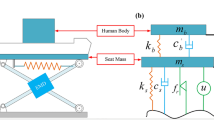Abstract
In this study, to suppress the vehicle-guideway coupled vibration with variable frequencies, an adaptive notch filter is designed for a maglev train on different elastic supporting beams at a low speed. By the analysis of the vibration signals from sensors of suspension control system, the effective frequency band of the vibration signals is determined firstly. Then the vibration frequency is real-time searched and identified with high resolution as the center frequency of a small effective bandwidth notch filter. Finally, the designed adaptive notch filter with the identified signal frequency, which always runs automatically, is used in a closed-loop control system of permanent-electro magnetic suspension-type maglev train. Theoretical analysis and simulation experiments show that the adaptive notch filter can restrain the resonance phenomenon on different elastic supporting beams effectively.








Similar content being viewed by others
References
Lee, H.W., Kim, K.C., Lee, J.: Review of maglev train technologies. IEEE Trans. Magn. 42, 1917–1925 (2006)
Nagai, M.: The control of magnetic suspension to suppress the selfexcited vibration of a flexible guideway. Jpn Soc. Mech. Eng. 30(260), 365–366 (1987)
She, L.H., Wang, H., Zou, D.S.: Hopf bifurcation of maglev system with coupled elastic guideway. In: Proceedings of the Twentieth International Conference on Magnetically Levitated Systems and Linear Drives, pp. 15–18 (2008)
Wang, H.P., Li, J., Zhang, K.: Stability and Hopf bifurcation of the maglev system with delayed speed feedback control. Acta Automatica Sinica 33(8), 829–834 (2007)
Zhang, L.L., Huang, L.H., Zhang, Z.Z.: Stability and Hopf bifurcation of the maglev system with delayed position and speed feedback control. Nonlinear Dyn. 57(1–2), 197–207 (2009)
Zhang, L.L., Huang, L.H., Zhang, Z.Z.: Hopf bifurcation of the maglev time-delay feedback system via pseudo-oscillator analysis. Math. Comput. Model. 52(5–6), 667–673 (2010)
Zou, D., She, L., Zhang, Z., Chang, W.: Maglev system controller design based on the feedback linearization methods. In: IEEE International Conference on Information and Automation, Zhangjiajie, China (2008)
Zhang, Z., Zhang, L.: Hopf bifurcation of time-delayed feedback control for maglev system with flexible guideway. Appl. Math. Comput. 219(11), 6106–6112 (2013)
Zhang, D., Li, Y.G., Liu, H.K., et al.: Restrain the effects of vehicleguideway dynamic interaction: bandstop filter method. In: Proceedings on Maglev2008 (2008)
Li, H., Goodall, R.M.: Linear and non-linear skyhook damping control laws for active railway suspensions. Control Eng. Pract. 7(7), 843–850 (1999)
Han, J.Q.: From PID to active disturbance rejection control. IEEE Trans. Ind. Electron. 56(3), 900–906 (2009)
Zhang, H., Shi, Y., Wang, J.: On energy-to-peak filtering for nonuniformly sampled nonlinear systems: a Markovian jump system approach. IEEE Trans. Fuzzy Syst. 22(1), 212–222 (2014)
Zhang, H., Mehr, A.S., Shi, Y.: Improved robust energy-to-peak filtering for uncertain linear systems. Signal Process. 90(9), 2667–2675 (2010)
Zhang, H., Shi, Y., Mehr, A.S.: Robust weighted H\(\infty \) filtering for networked systems with intermitted measurements of multiple sensors. Int. J. Adapt. Control. Signal Process. 25(4), 313–330 (2011)
Zhang, H., Shi, Y.: Parameter-dependent H\(\infty \) filtering for linear timevarying systems. Trans. ASME J. Dyn. Syst. Meas. Control 135(2), 021006–021012 (2013)
Zhang, H., Shi, Y., Mehr, A.S.: On H\(\infty \) filtering for discrete-time Takagi-Sugeno fuzzy systems. IEEE Trans. Fuzzy Syst. 20(2), 396–401 (2012)
Zhang, L., Zhang, Z., Huang, L.: Hybrid nonlinear differentiator design for permanent-electro magnetic suspension maglev system. Signal Process. 6(6), 559–567 (2012)
Mukoyama, S., et al.: Load test of superconducting magnetic bearing for MW-class flywheel energy storage system. J. Phys. Conf. Ser. 871(1), 012090 (2017)
Santra, T., et al.: Vibration control of a hybrid magnetic bearing using an adaptive sliding mode technique. J. Vib. Control 1, 107754631771788 (2017)
Van Sum, N.: An experiment based on fuzzy logic control for an active magnetic bearigs system. 126(1B) (2017)
Wajnert, D.: Simulation for the determination of the hybrid magnetic bearing’s electromagnetic parameters. Przeglad Elektrotechniczny 1(2), 159–162 (2017)
Xue, S., et al.: A high precision position sensor design and its signal processing algorithm for a maglev train. Sensors 12(5), 5225–5245 (2012)
Long, Z., et al.: Fault-diagnosis for the accelerometer of maglev suspension system based on signal comparison. Chin. J. Sci. Instrum. 32(12), 2641–2647 (2011)
Long, Z., et al.: Fault-diagnosis for the accelerometer of maglev suspension system based on signal comparison. Chin. J. Sci. Instrum. 32(12), 2641–2647 (2011)
Iwasa, Y., et al.: Electromaglev-levitation data for single and multiple bulk YBCO disks. IEEE Trans. Appl. Supercond. 9(2), 984–987 (1999)
Acknowledgements
This work was supported by the National Natural Science Foundation of China (61304036), and China Postdoctoral Science Foundation (2014M562651, 2015T81132), the Natural Science Foundation of Hunan Province, China (2015JJ3019). The authors wish to thank the anonymous reviewers for their efforts in providing constructive comments that have helped to significantly enhance the quality of this paper.
Author information
Authors and Affiliations
Corresponding author
Rights and permissions
About this article
Cite this article
Zhang, ZZ. Adaptive notch filter design for levitation sensing system based on vibration computation. Cluster Comput 22 (Suppl 3), 5257–5267 (2019). https://doi.org/10.1007/s10586-017-1206-8
Received:
Revised:
Accepted:
Published:
Issue Date:
DOI: https://doi.org/10.1007/s10586-017-1206-8




